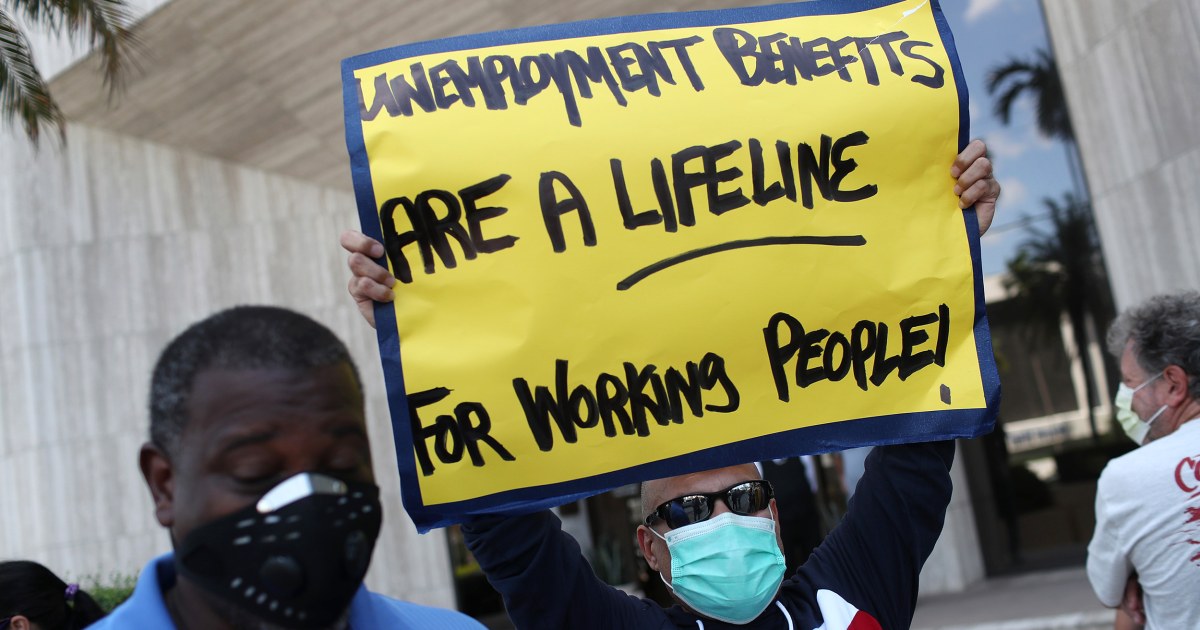
The federal pandemic unemployment benefits program ends Monday, leaving millions to wonder how they’ll make ends meet for their families.
An estimated 7.5 million people will be affected, according to calculations by the Century Foundation, a progressive think tank. An additional 2.1 million unemployed people will lose the $300 per week federal supplement.
Since the start of the pandemic, the government has spent almost $800 billion in unemployment assistance, intended as short-term measures to support households and keep the economy going.
The programs included Pandemic Unemployment Assistance, which kicked in after regular state unemployment benefits expired, and Pandemic Emergency Unemployment Compensation, which was extended to gig workers who were not normally eligible for benefits.
But Covid has more patience than Washington, which appears to have little appetite to extend the benefits, even as the delta variant rages.
“Food stamps and the child tax credit can avert destitution, but many people are in harm’s way now.”
NBC News spoke with several households earlier in the summer as more than two dozen states began prematurely opting out of the federal benefits program. The families described desperate circumstances. Months later, how their choices played out offer a preview of what awaits the newcomers.
Despite a labor shortage, they applied for jobs and didn’t get them. They accepted front-line Covid risks to make money. They took lower-paying jobs in a related industry. They helped out, unpaid, with a family member’s business. They filed for community assistance to keep the utilities on and eviction notices at bay.
Sherry Pratt, 47, an unemployed print marketing sales representative in New Hampshire, has a child with special needs. Like many, she struggled to find a job that would pay enough to cover child care while she is at work.
Instead, she turned the crisis on its head and started watching other kids in her home.
“I can still be flexible and home with my daughter when she gets home from school,” Pratt said, “as well as my 11-month old granddaughter so that my oldest daughter can keep her job.”
The money isn’t much, but it helps. “I’m certainly not making as much as I was before Covid, but I’m doing what I can,” Pratt said.
Business and political leaders looking at the math of the 8.4 million unemployed and over 10 million open positions have predicted a flood of applicants when benefits end. The data tells a different story.
For every 8 workers who lost benefits, only 1 found a job, according to recent research.
The leading reasons why the unemployed aren’t taking jobs have little to do with government money and everything to do with the health and economic crisis: child care scarcity and cost, fear of getting or spreading Covid-19, and taking care of someone with the disease or getting sick themselves, according to the latest Census survey.
A study by JPMorgan Chase shows that the immediate result of the end of benefits is not a rush to work, but a sharp decrease in household spending.
“The average person can’t find a job right away and will have cutbacks,” said Till von Wachter, professor of economics at the University of California Los Angeles.
The main issue is that funds were established with a deadline given by politicians and do not adjust, even if economic conditions don’t improve or worsen, he said.
“We wouldn’t be in this mess if we had a functional system of extended benefits that responded to local conditions on the ground,” von Wachter said.
Jordan Motteler, 30, of Oklahoma City, Oklahoma, hasn’t worked since she and her husband were laid off in March 2020. She wants to work, but can’t take the risk because she and her daughter are immunocompromised. Her husband, laid off from Lowe’s, has started to pick up some work as a plumber’s apprentice. But the hours and wages are lower than his previous job. The family is applying for rent and utility assistance from a local community organization.
“A lot of us live paycheck to paycheck just hoping we have enough to get everything our kids need, not even ourselves,” Motteler said.
The families NBC News spoke with in the summer have not had to move in with family or experience homelessness. But they face higher food and housing insecurity, and they haven’t been able to rush back into the workforce.
“The outcome that is supposed to occur is people finding jobs,” said Andrew Stettner, a senior fellow at the Century Foundation. “But America has not returned to the normal we hoped for. There are some other programs like food stamps and the child tax credit that can avert destitution, but many people are in harm’s way now.”
Those who do secure work can find themselves working at greatly reduced pay.
Fouzia Coopman, 52, was a restaurant general manager in Honolulu, making over $70,000 a year before she was laid off. “I have been applying every single day and, hallelujah, I got an offer working the front desk at a hotel for $16 an hour,” she said. After paying her rent, she will have just over $600 a month to pay her other bills and food. “I’ll let you do the calculations,” she said. “B.S.”
Unemployed families now facing the cut off in federal benefits fear what comes next as the delta variant rages. Those with access to credit cards plan on running them up and missing payments until they can figure out another option.
“Will most likely ruin the credit I’ve established over the last eight years because when it comes to food or paying a credit card I have to feed my child,” said Sarah Taylor, 49, a single mother of a seven-year-old daughter, who lost her job as a dental courier when the pandemic hit.
Others say they feel like they’re staring into the abyss.
“Covid-19 took my marriage, my daughter, my career and my hope,” said Scott Palmer, a 53-year-old from Virginia who lost his job as an events manager for a large catering company when the pandemic hit, and now faces the expiration of federal benefits. He lost his wife to coronavirus and his daughter to cancer.
“Thirty-one days before I’m homeless,” Palmer said.
Source: | This article originally belongs to Nbcnews.com









